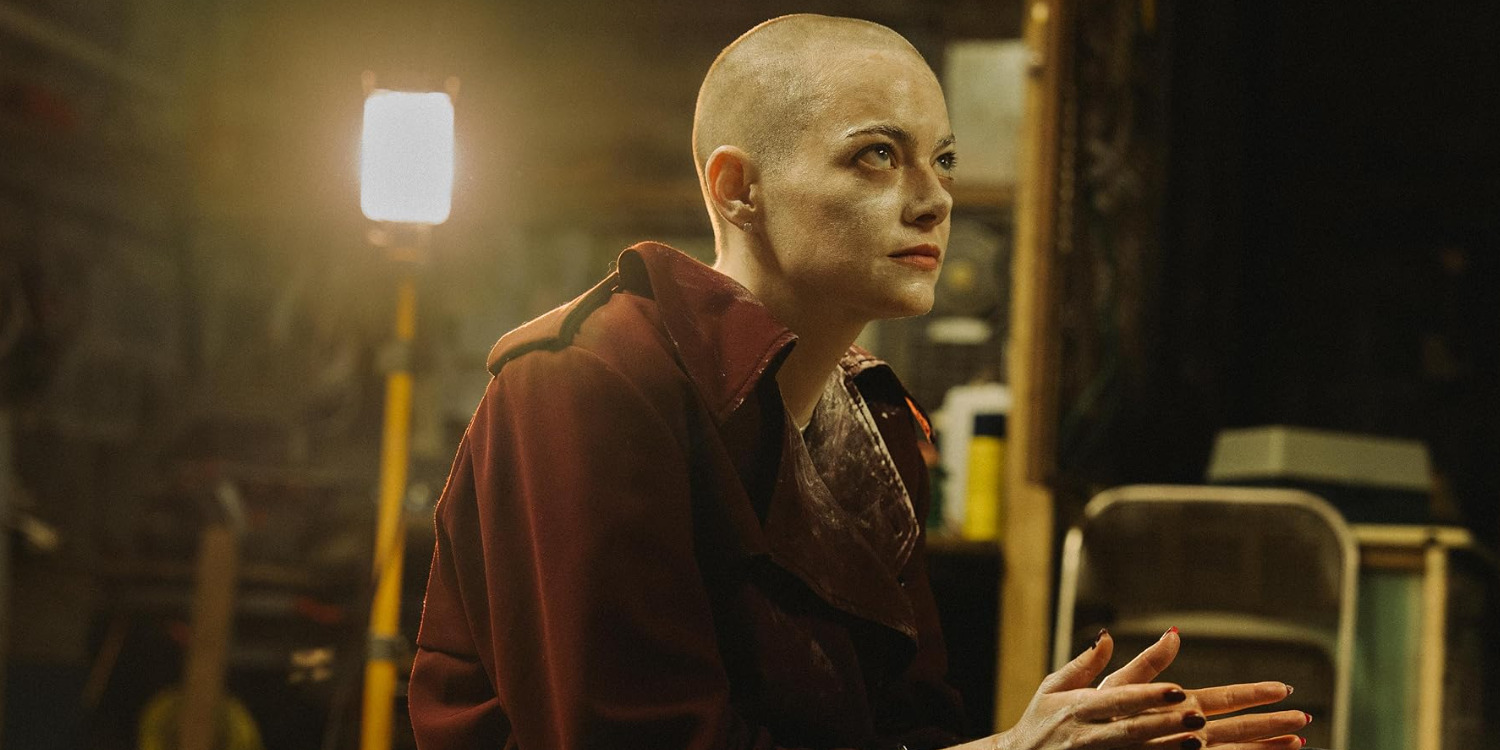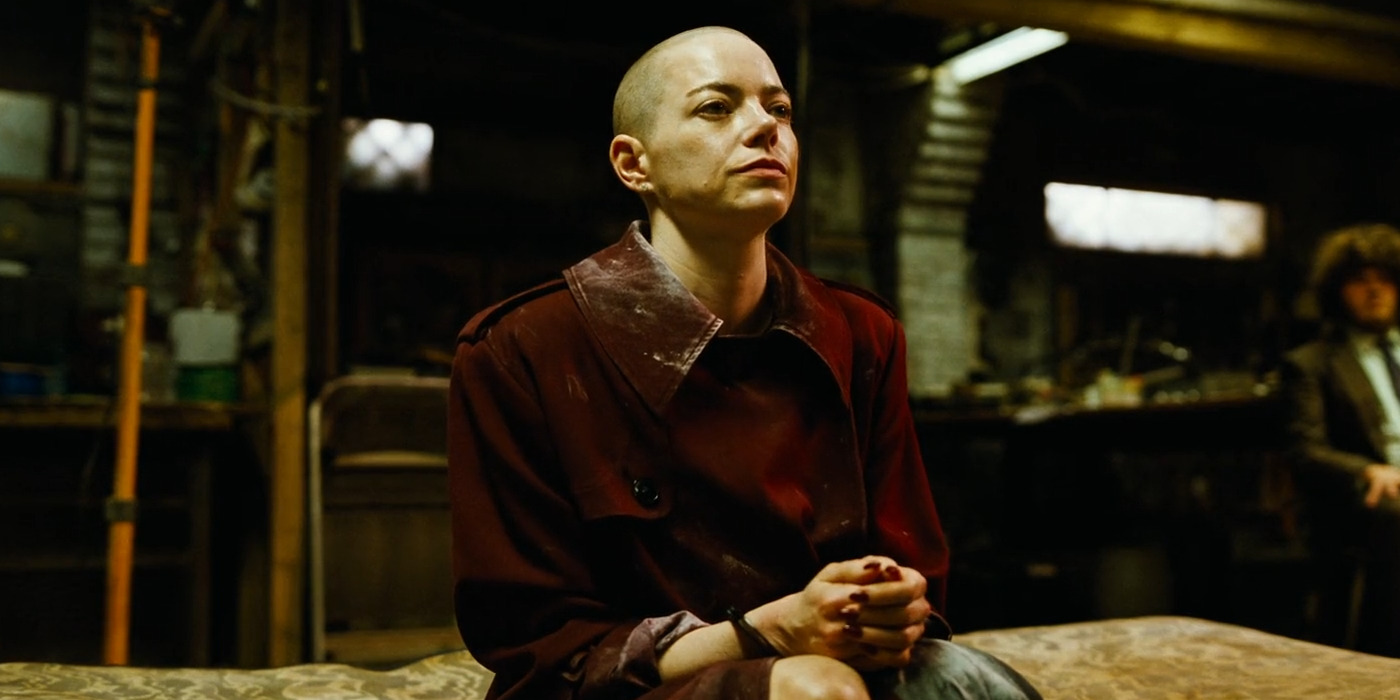The dark comedy satirical film ‘Bugonia’ is steeped in the world of conspiracy theories. The film’s co-protagonists are the diametrically opposed characters Teddy, the alien-obsessed conspiracist, and Michelle Fuller, his unfortunate target. The former is convinced that a race of extraterrestrial species controls and manipulates life on Earth and is planning on extinguishing humans from the face of the planet. Therefore, he believes the only way to stop this inevitable doomsday is by kidnapping one of these aliens and generating an audience with the unearthly Emperor. Unfortunately for Michelle, the CEO of a biomedical company, he seems to have concluded that she is one of these presumed aliens. As a result, before she knows it, she finds herself bound in the conspiracy theorist’s basement, exposed to torture of both the physical and psychological kind. The film’s premise offers an intriguing narrative about humanity, truth, and the beyond. The story’s unique title plays into these foundational themes. SPOILERS AHEAD!
Bugonia Comes From an Ancient Mediterranean Practice of Sacrifice and Regeneration
Within its high-concept premise, ‘Bugonia’ presents a deeply nuanced and varied storyline that speaks to a number of concepts and themes. Although the origin of the film’s title itself may initially seem to be somewhat disconnected from its narrative, the name encompasses the core of the tale in crucial ways. The word Bugonia, which means “oxen-born” in Greek, stems from a folk practice that originated in the ancient Mediterranean region. References to this idea are present in Virgil’s ‘Georgics’ poems, believed to have been published around 29 BCE. In the poet’s story, a shepherd named Aristaeus suffers the loss of his bee population as a result of disease and hunger. As a result, his mother, the nymph Cyrene, shares a ritual with him to replenish his resources.

The ritual included the sacrifice of a bull or an ox through severe, violent beating in a way that required no loss of the animal’s blood. At the end of the act, once its body was left to rot, bees would have generated from the carcass, leaving little evidence of the animal behind. Thus, ancient Mediterranean folklore came to include the belief that bees were generated, spontaneously, from the carcass of a dead cow. Reportedly, this myth and Aristaeus’ tale offered a dubious solution to beekeepers for replenishing their dwindling bee numbers. While the myth itself is evidently only a legend without any truth behind it, there is speculation about whether or not the entire practice of Bugonia served a poetic purpose rather than any real-life beekeeping practices.
The Ancient Ritual And Its Connections to Bugonia’s Story
As a folk practice, Bugonia represents the ideas of death and renewal, conveying a myth about regeneration from destruction. As per the ancient practice of the Mediterranean region, a cow must die a brutal and violent death in order for new life to emerge in the form of a colony of bees. As the story in ‘Bugonia’ progresses through Teddy and Michelle’s game of chess, it arrives at a climax that represents much the same idea. In the film, Teddy’s belief that Michelle is an alien is initially treated as evidence of his conspiracy-obsessed mania. However, by the end, it becomes clear that the protagonist was actually never in the wrong. Everything he believes about aliens and their infiltration among humans is actually true. Similarly, his belief that the Andromedans want to destroy the human race is also true and comes to fruition at the end of the story.

The Andromedans have been around for a long time, attempting to save the human race from itself. However, by the film’s end, Michelle, the Emperor, decides that humans are beyond saving. As a result, she ends the lives of all humans on Earth with the simple pop of a bubble. In the blink of an eye, humanity dies, leaving the planet to be inherited by nature and wildlife. Notably, although the act is inherently a violent one, it comes without any bloodshed. Therefore, in this scenario, humanity becomes the ox, while the plants, animals, bugs, and all other living organisms that are free to thrive without human intervention become the colony of bees rising from the rotting carcass.
Bugonia’s Capacity for Ambiguity Makes it the Perfect Title for the Film
The historical and mythological roots of the word Bugonia certainly play a part in its employment as the title for the Yorgos Lanthimos film. However, there’s a different reason why writer Will Tracy deemed it to be the perfect fit for the project. He spoke about it in an interview with the Independent, sharing, “I think (also), we just liked the ambiguity of the title as well. It (‘Bugonia’) kinda sounds like an insect, kinda sounds like a flower, kinda sounds alien, but also sounds like a place, maybe, that could be on Earth. It might also sound like an illness that someone might have. So, I think the non-specificity of it was also kind of attractive.”

While the more surface-level reading of the title’s connection to the story remains possible, where the sacrificial cow can be seen as a metaphor for American life, or human civilization as a whole, there’s another perspective to be adopted. The destruction of humanity with a simple switch may offer a viable, if brutal solution to growing crises of global warming and even Colony collapse disorder of the bees, in the fictional world of ‘Bugonia.’ However, off-screen, a different reality persists, one where the destruction of humanity isn’t a swift possibility nor a desirable solution. Instead, the benefit only lies in the recognition that humanity and nature are one and the same and that the progress of one necessitates the preservation of the other.
Read More: Did Emma Stone Shave Her Head in Real Life for Bugonia?


You must be logged in to post a comment.